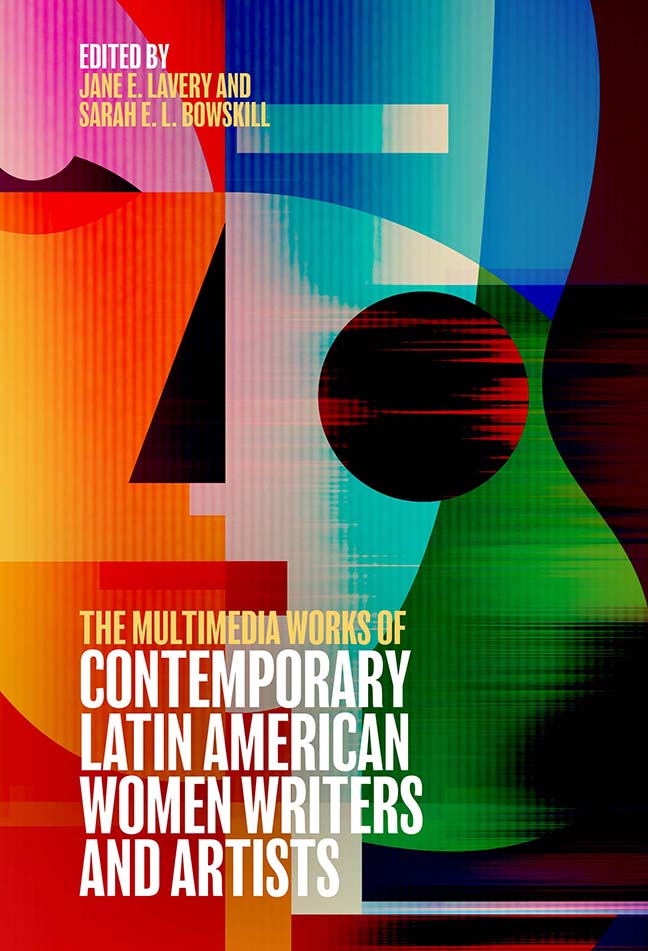Book contents
- Frontmatter
- Contents
- List of Illustrations
- List of Contributors
- Acknowledgments
- Introduction: A Crosscurrent of Contemporary Latin American Women Multimedia Writers and Artists
- 1 The Transliterary: The Novel and Other Multimedia Horizons Beyond (and Close to) the Textual
- 2 Commentary on Fe/males: Sieges of the Post Human (Transmedia Installation)
- 3 An Anthropophagic Ch’ixi Poetics
- 4 My Relationship with Artistic Creation Began with Words
- 5 Imagetext
- 6 Voices/Bodies
- 7 Redefining Meaning: The Interweaving of the Visual and Poetic
- 8 The Territory Is Home
- 9 Reflections on a Multimedia Practice
- 10 Digital Weaving
- 11 Eli Neira, Regina José Galindo, and Ana Clavel: “Polluting” Corporealities and Intermedial/Transliterary Crossings
- 12 The Digital Condition: Subjectivity and Aesthetics in “Fe/males” by Eugenia Prado Bassi
- 13 The Transmedia, Post-Medium, Postnational, and Nomadic Projects of Pilar Acevedo, Rocío Cerón, and Mónica Nepote
- 14 The Art of the Hack: Poets Carla Faesler and Mónica Nepote and Booktuber Fátima Orozco
- 15 The Places of Pain: Intermedial Mode and Meaning in Via Corporis by Pura López Colomé and Geografía del dolor by Mónica González
- 16 Words, Memory, and Space in Intermedial Works by Gabriela Golder and Mariela Yeregui
- 17 Fungibility and the Intermedial Poem: Ana María Uribe, Belén Gache, and Karen Villeda
- 18 Hypertext and Biculturality in Two Autobiographical Hypermedia Works by Latina Artists Lucia Grossberger Morales and Jacalyn Lopez Garcia
- 19 Dialogues Across Media: The Creation of (New?) Hybrid Genres by Belén Gache and Marina Zerbarini
- Bibliography
- Index
- Tamesis
11 - Eli Neira, Regina José Galindo, and Ana Clavel: “Polluting” Corporealities and Intermedial/Transliterary Crossings
Published online by Cambridge University Press: 17 December 2023
- Frontmatter
- Contents
- List of Illustrations
- List of Contributors
- Acknowledgments
- Introduction: A Crosscurrent of Contemporary Latin American Women Multimedia Writers and Artists
- 1 The Transliterary: The Novel and Other Multimedia Horizons Beyond (and Close to) the Textual
- 2 Commentary on Fe/males: Sieges of the Post Human (Transmedia Installation)
- 3 An Anthropophagic Ch’ixi Poetics
- 4 My Relationship with Artistic Creation Began with Words
- 5 Imagetext
- 6 Voices/Bodies
- 7 Redefining Meaning: The Interweaving of the Visual and Poetic
- 8 The Territory Is Home
- 9 Reflections on a Multimedia Practice
- 10 Digital Weaving
- 11 Eli Neira, Regina José Galindo, and Ana Clavel: “Polluting” Corporealities and Intermedial/Transliterary Crossings
- 12 The Digital Condition: Subjectivity and Aesthetics in “Fe/males” by Eugenia Prado Bassi
- 13 The Transmedia, Post-Medium, Postnational, and Nomadic Projects of Pilar Acevedo, Rocío Cerón, and Mónica Nepote
- 14 The Art of the Hack: Poets Carla Faesler and Mónica Nepote and Booktuber Fátima Orozco
- 15 The Places of Pain: Intermedial Mode and Meaning in Via Corporis by Pura López Colomé and Geografía del dolor by Mónica González
- 16 Words, Memory, and Space in Intermedial Works by Gabriela Golder and Mariela Yeregui
- 17 Fungibility and the Intermedial Poem: Ana María Uribe, Belén Gache, and Karen Villeda
- 18 Hypertext and Biculturality in Two Autobiographical Hypermedia Works by Latina Artists Lucia Grossberger Morales and Jacalyn Lopez Garcia
- 19 Dialogues Across Media: The Creation of (New?) Hybrid Genres by Belén Gache and Marina Zerbarini
- Bibliography
- Index
- Tamesis
Summary
Contagion as metaphor permeates critical discourses from the medical sciences, the humanities to the social sciences. Because of its association with the literal sense of contagion as disease/infection, this figure of speech carries negative connotations of crisis or threat including “moral contagion,” “emotional contagion,” “cultural contagion” and “social contagion” (Mitchell, Contagious Metaphor 1–2). However, “thought contagion” as a metaphor has also become imbued with positivity: “a byword for creativity and a fundamental process by which knowledge and ideas […] are communicated and taken up” (Mitchell, Contagious Metaphor 4). Taking my cue from this more optimistic understanding, the notion of contagion, both in terms of the crossover of forms and thematic dissidences challenging the hegemonic cultural or racial-sociopolitical status quo, seems a propitious one when describing the multimedia works of Eli Neira (b. 1973, Chile), Regina José Galindo (b. 1974, Guatemala) and Ana Clavel (b. 1961, Mexico). Within this volume, contagion can be linked to Debra Castillo's discussion of the “fungibility” of intermedial digital poetry (219–34), to Sarah Bowskill's idea, drawn from the work of Motín Poeta, of multimediality as a “contamination between artistic languages” (145 n.2) and to Eli Neira's “Ch’ixi or ‘sullied’ mestizo identity, a compendium of impure attributes and hybrid techniques” (59). If genre, media, and mode become the key means by which forms of culture (literature, music, film, image) are (pre)categorized according to a set of “pure” qualities, then nowhere is this contamination more evident than in the multimedial, intermedial, or transliterary works of performance-artists-writers-poets Neira and Galindo and multimedia writer and artist Clavel, whose self-conscious engagement with cultural hybridization highlights our understanding of genre/media/mode as a dynamic process, rather than as a pre-given set of rules (Frow 2–5).
Even the labels used here to describe the respective specialism – a notion typically denoting singular expertise – of Neira, Clavel, and Galindo have proven difficult to choose given the highly diverse and skilled artistic and (non)literary forms from which their works draw. While they often stress their status as either writer (Clavel) or performance artist and poet (Neira/ Galindo), they share, each in their own particular way, an interest in breaking generic conventions by combining multi-hyper-intermedially and/or transliterarily “conventional” forms (e.g. poetry, photography, fiction) with more recent developments (digital technologies e.g., blogging, videos, website, online art, and (video) performance art).
Information
- Type
- Chapter
- Information
- Publisher: Boydell & BrewerPrint publication year: 2023
